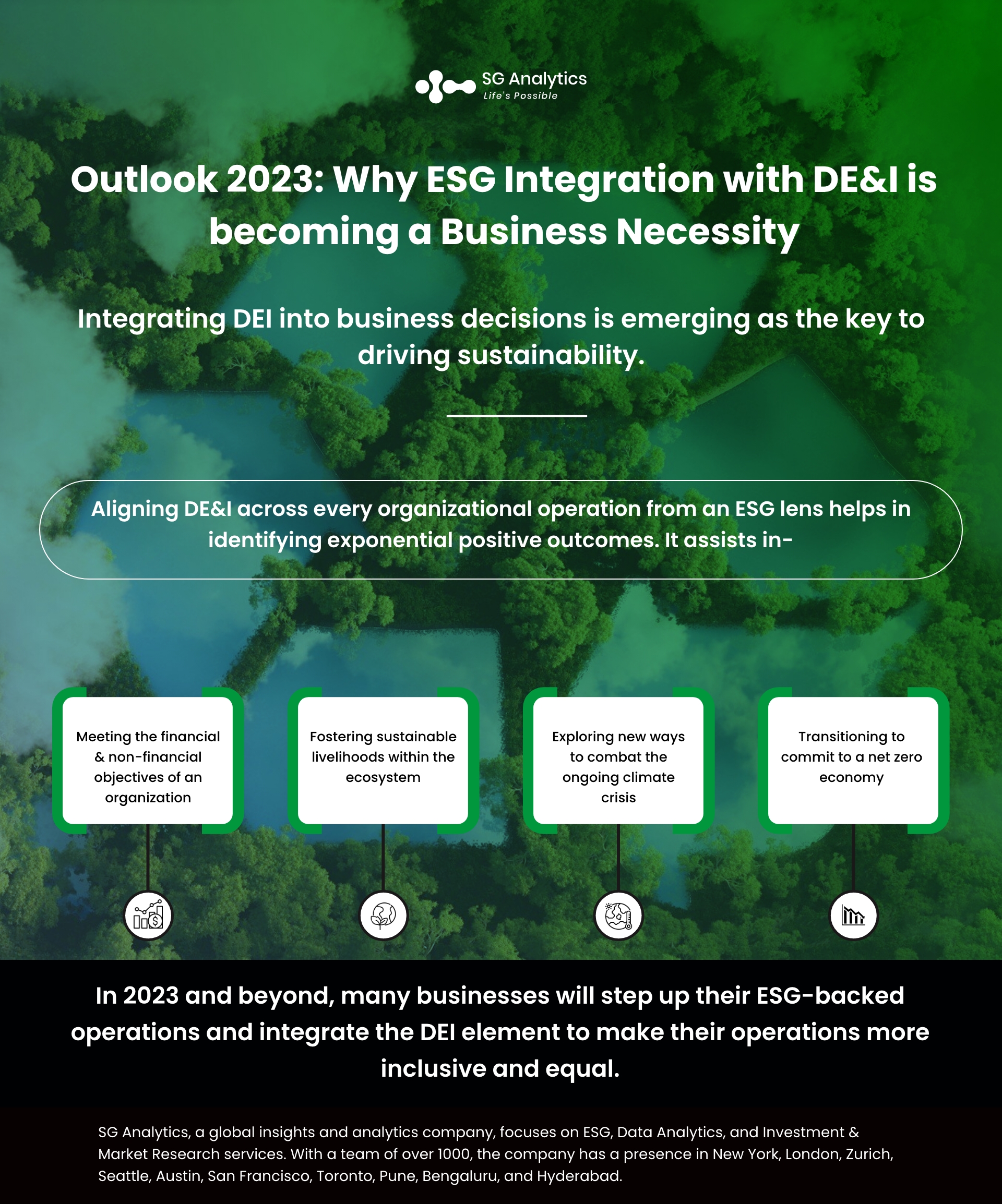Today the world is at a crossroads due to the escalating investor and customer demands along with the expanding regulatory intervention. There has been a strong movement for organizations to transition from being profit-centric to more people, planet, and prosperity-centric enterprises. And this is not just a desirable shift but an imperative to growth to drive a sustainable future.
Integrating DEI into business decisions is emerging as the key to driving sustainability. This implies re-aligning business goals from a traditional consumption model to a more holistic contribution model. The impact and influence can then be measured across the full life cycle within the larger ecosystem. New policies and practices are being designed and developed to foster a culture of safety and well-being, enabling organizations to contribute their best potential and carry their best ideas to fruition.
And two buzzwords that are garnering all the limelight as well as sparking a lot of questions and controversy today are - ESG and DEI.
- ESG – Environmental, Social, and Governance
- DEI – Diversity, Equity, and Inclusion
Read more: Sustainability Outlook: Top Emerging Trends in 2023 and Beyond
While many organizations are trying to turn ESG issues into culture wars, most are recognizing the significance of their commitments to accomplishing and advancing on the path of inclusion and the commitments it brings along for organizational growth. It is undeniable that DEI and access to resources are the first principles that fuel the organization’s growth, ensure sustainability, and help them meet new business objectives. And both are equally vital for the long-term sustainable growth of an organization.

Navigating ESG Uncertainty in Business Operation
ESG and DEI are assisting businesses to create long-term sustainable growth for an organization – especially as we think about the ethnic makeup and the priorities of future generations.
But how can employers and employees address and adapt to the rising demand for ESG needs?
And how can today’s businesses build an ESG-driven landscape for the future workforce?
Any organization that is already in the process of embracing the ESG framework or is planning to embark on the ESG journey needs to align its operations with the following factors-
-
Leadership responsibility
-
Employee alignment
-
Stakeholder engagement
-
Disclosure & ESG reporting
Adding these people-centric dimensions to the existing framework helps in identifying as well as addressing the existing operations through the DE&I lens. For the DE&I integration to be optimal and effective, organizations need to report and audit their operations.

For businesses to achieve this kind of inclusion in making decisions, they need to tap into the power of employee resource groups that can assist them as internal focus groups, thus heading the significance of fostering diversity within the organization.
Read more: Outlook 2023: Top Strategic Technology Challenges
Some steps could involve undertaking a policy audit or an inclusion survey to review the existing policies and their utilization. Organizations can also conduct gender & other diversity-based infrastructure audits as well as map their secondary research for best practices. These will not only help in dovetailing DE&I into the organizational culture, policies, and practices but also enable them to effectively track the progress using requisite metrics.
Understanding the Relationship Between ESG and DEI for Sustainability
Industry leaders are exploring the significance of strategies for diversity, equity, and inclusion (DEI) and discussing the trends that are shaping the way organizations pursue their goals. During such tough times, it is vital for businesses to establish organizational investments and drive DEI priorities to create a positive impact on the bottom line. But the lack of commitment to DEI is harming the company’s efforts to be inclusive.
Organizations need to integrate the DEI values at the heart of their sustainability policies to gain a competitive edge in the market. They are setting new frameworks to describe their role in business development, brand building, and community engagement. To serve diverse populations, they are also initiating new community outreach programs and focusing on the requirements of the community.

Why is DEI Important for Business?
Aligning DE&I across every organizational operation from an ESG lens helps in identifying exponential positive outcomes. It assists in-
-
Meeting the financial & non-financial objectives of an organization
-
Fostering sustainable livelihoods within the ecosystem
-
Exploring new ways to combat the ongoing climate crisis
-
Transitioning to commit to a net zero economy
Read more: Next In: Enterprise Sustainability Investments in Technology
Organizations oriented towards holistically addressing ESG issues and integrating them with DE&I elements will achieve better revenue growth, along with market access, productivity, profitability, and strengthening of stakeholder relations. In 2023, these elements will enable organizations to improve their brand's reputation. This positive net impact of aligning financial and non-financial components with ESG & DEI will also help in enhancing and replenishing resources, averting risks, and building a long-term framework for sustained performance and growth of the organization.

Integrating DE&I into the ESG Framework
Today the primary economic consumption focus of the economy is exposing organizations to many vulnerabilities that are posing a grave threat to their survival. With businesses still recovering from the weaknesses of the pandemic, they are exploring new avenues to revamp their existing systems and institutions of agility and resilience.
The ESG framework guides organizations to disclose their policies and progress on framework related to social issues like human rights, health & safety, discrimination, employee well-being, and equity. Adopting the ESG framework, therefore, empowers organizations to integrate the DE&I roadmap and work towards enabling a diverse culture.
Organizations are identifying the key DE&I elements to drive a holistic value-creation framework for ESG. Today the larger ecosystem mandates concurrently addressing a range of sustainability matters which involve economics, business ethics, environmental safety, and transparency in operations. Businesses are also expected to foster inclusive growth and equitable development, along with minimizing the adverse impacts on social, cultural, and economic aspects of society. All the core components in the ESG framework require a strong underlying component that will enable organizations to address the elements of D, E, & I intuitively.

To make this future viable, organizations need to plan the integration of DE&I into their sustainability policies from an impact as well as influence perspective. This could prove to be the segway to establishing a net zero economy.
Read more: How can Leaders Establish a Culture of Curiosity and Innovation in their Organization?
Conclusion
The constant push and pull to adopt the ESG framework are undisputed. Investors shareholders, regulators, employees, and consumers alike are demanding organizations incorporate a more holistic and sustainable approach that goes beyond economics. Here lies the opportunity for businesses to reframe their business framework and step-up new policies to contribute to shaping an equal future and redefine sustainability.

The way businesses tackle sustainability issues has changed significantly during the past decade. Introducing long-term thinking and integrating sustainability into business operations is now becoming widely recognized. 2022 was a year where businesses delivered a checkered performance on the ESG - Environmental, Social, and Governance fronts. However, moving forward in 2023 and beyond, institutions need to take into consideration both public and private perspectives and step up their ESG game to deliver sustainably at scale.
Considering the outlook for 2023 and beyond, many businesses will have to step up their ESG-backed operations and integrate the DEI element to make their operations more inclusive and equal. They will have to take on challenges beyond profit maximization and introduce sustainable and scalable transformation. For businesses to successfully embark on their ESG ambitions in 2023, they will have to strive to deliver a net-positive impact for their corporate existence.
With a presence in New York, San Francisco, Austin, Seattle, Toronto, London, Zurich, Pune, Bengaluru, and Hyderabad, SG Analytics, a pioneer in Research and Analytics, offers tailor-made services to enterprises worldwide.
A leader in ESG Services, SG Analytics offers bespoke sustainability consulting services and research support for informed decision-making. Contact us today if you are in search of an efficient ESG integration and management solution provider to boost your sustainable performance.









